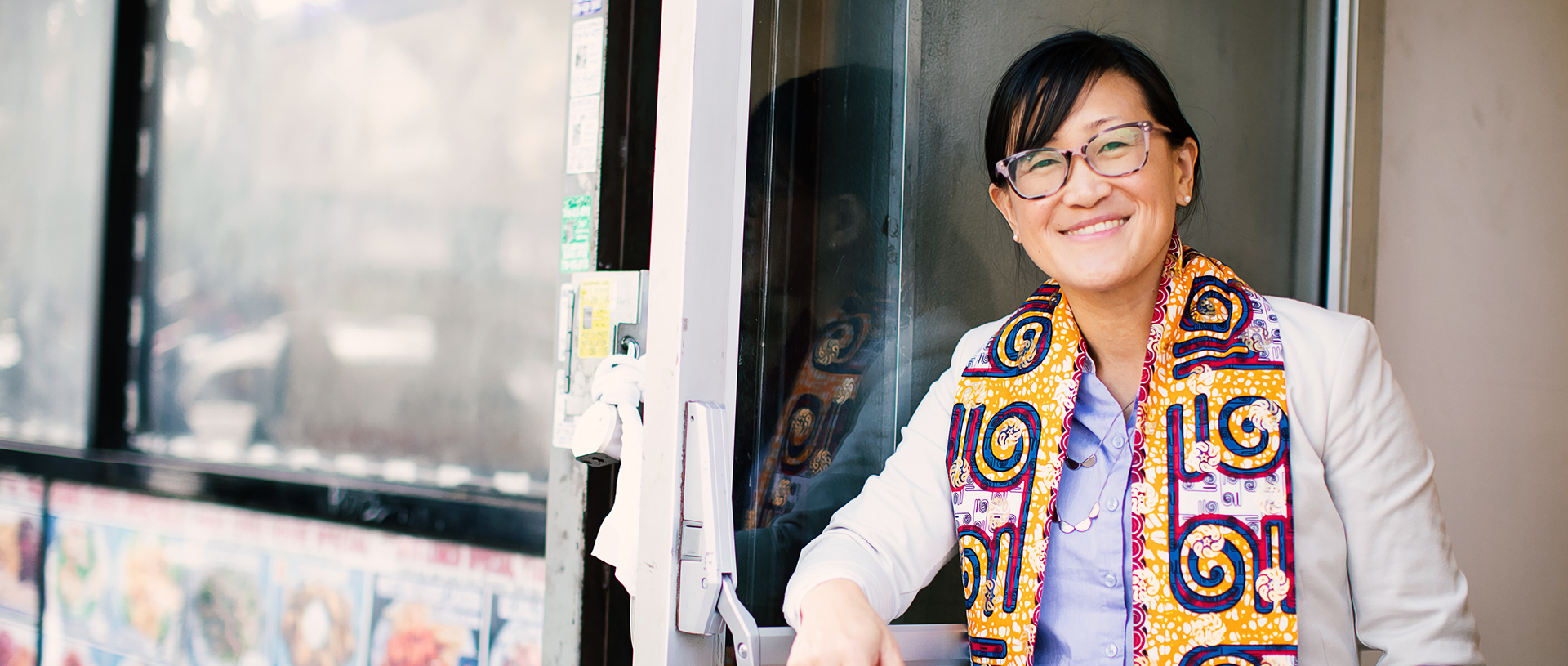
On a Sunday afternoon in April 2021, a group of 30 people wearing matching t-shirts descended upon Daps Eats, a small Caribbean restaurant on 125th Street in Harlem. A live band played upbeat music on the patio while the group socialized and waited for their plates of jerk chicken. Passersby, drawn in by the lively atmosphere, stopped to dance, including several people who carried drums and jammed with the band for a while. For a small, locally owned restaurant like Daps Eats, such a scene was unheard of—but that’s why the group was there.
It was a cash mob, a regular ministry organized by Metro Hope Church NYC. “A whole bunch of us go, and we literally mob a local small business,” says Wendy Hu-Au (MDiv ’17), executive pastor at Metro Hope. “We bring cash because cash typically stays in a neighborhood longer than credit.” The party-like atmosphere of the day was no accident either. “That’s kind of the heart of a cash mob—it brings the community together. It’s a visible way to support a business.” That day at Daps Eats, the restaurant’s owner had a chance to share his own vision for his business with the group, how he wants to serve his community and bring people joy with food. “That posture is important to us,” says Wendy. “We definitely want to support people who are invested in Harlem, who care about the community and the neighborhood.” Metro Hope partners with other nonprofit organizations to put on the cash mobs, including one organization that helps the small businesses secure loans, create business plans, and learn to manage their budgets.
This kind of partnering is a natural ministry move for Metro Hope, a church whose rootedness in their community is central to their purpose. “Harlem is a huge geographical area in New York,” says Wendy, and East Harlem, where their church meets, has its own unique personality and needs. She points out that the neighborhood, which has a strong Afro-Latino community and many other cultures represented, is experiencing some changes. Grocery chains like Trader Joe’s and Whole Foods are opening locations, which “isn’t necessarily bad,” Wendy says, but adds, “We just want to make sure people who have been here for a long time can still afford to live here and be a part of the community.” While cash mobs are a tangible investment Metro Hope makes in East Harlem, the church is constantly on the lookout for new ways they can strengthen the neighborhood.
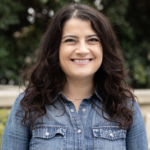
Joy Netanya Thompson (MAT ’12) is Fuller’s editorial director and senior writer.
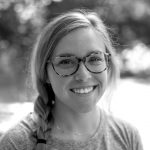
Katy Cook is the art director and lead designer for FULLER studio and other
On a Sunday afternoon in April 2021, a group of 30 people wearing matching t-shirts descended upon Daps Eats, a small Caribbean restaurant on 125th Street in Harlem. A live band played upbeat music on the patio while the group socialized and waited for their plates of jerk chicken. Passersby, drawn in by the lively atmosphere, stopped to dance, including several people who carried drums and jammed with the band for a while. For a small, locally owned restaurant like Daps Eats, such a scene was unheard of—but that’s why the group was there.
It was a cash mob, a regular ministry organized by Metro Hope Church NYC. “A whole bunch of us go, and we literally mob a local small business,” says Wendy Hu-Au (MDiv ’17), executive pastor at Metro Hope. “We bring cash because cash typically stays in a neighborhood longer than credit.” The party-like atmosphere of the day was no accident either. “That’s kind of the heart of a cash mob—it brings the community together. It’s a visible way to support a business.” That day at Daps Eats, the restaurant’s owner had a chance to share his own vision for his business with the group, how he wants to serve his community and bring people joy with food. “That posture is important to us,” says Wendy. “We definitely want to support people who are invested in Harlem, who care about the community and the neighborhood.” Metro Hope partners with other nonprofit organizations to put on the cash mobs, including one organization that helps the small businesses secure loans, create business plans, and learn to manage their budgets.
This kind of partnering is a natural ministry move for Metro Hope, a church whose rootedness in their community is central to their purpose. “Harlem is a huge geographical area in New York,” says Wendy, and East Harlem, where their church meets, has its own unique personality and needs. She points out that the neighborhood, which has a strong Afro-Latino community and many other cultures represented, is experiencing some changes. Grocery chains like Trader Joe’s and Whole Foods are opening locations, which “isn’t necessarily bad,” Wendy says, but adds, “We just want to make sure people who have been here for a long time can still afford to live here and be a part of the community.” While cash mobs are a tangible investment Metro Hope makes in East Harlem, the church is constantly on the lookout for new ways they can strengthen the neighborhood.
Joy Netanya Thompson (MAT ’12) is Fuller’s editorial director and senior writer.
Katy Cook is the art director and lead designer for FULLER studio and other
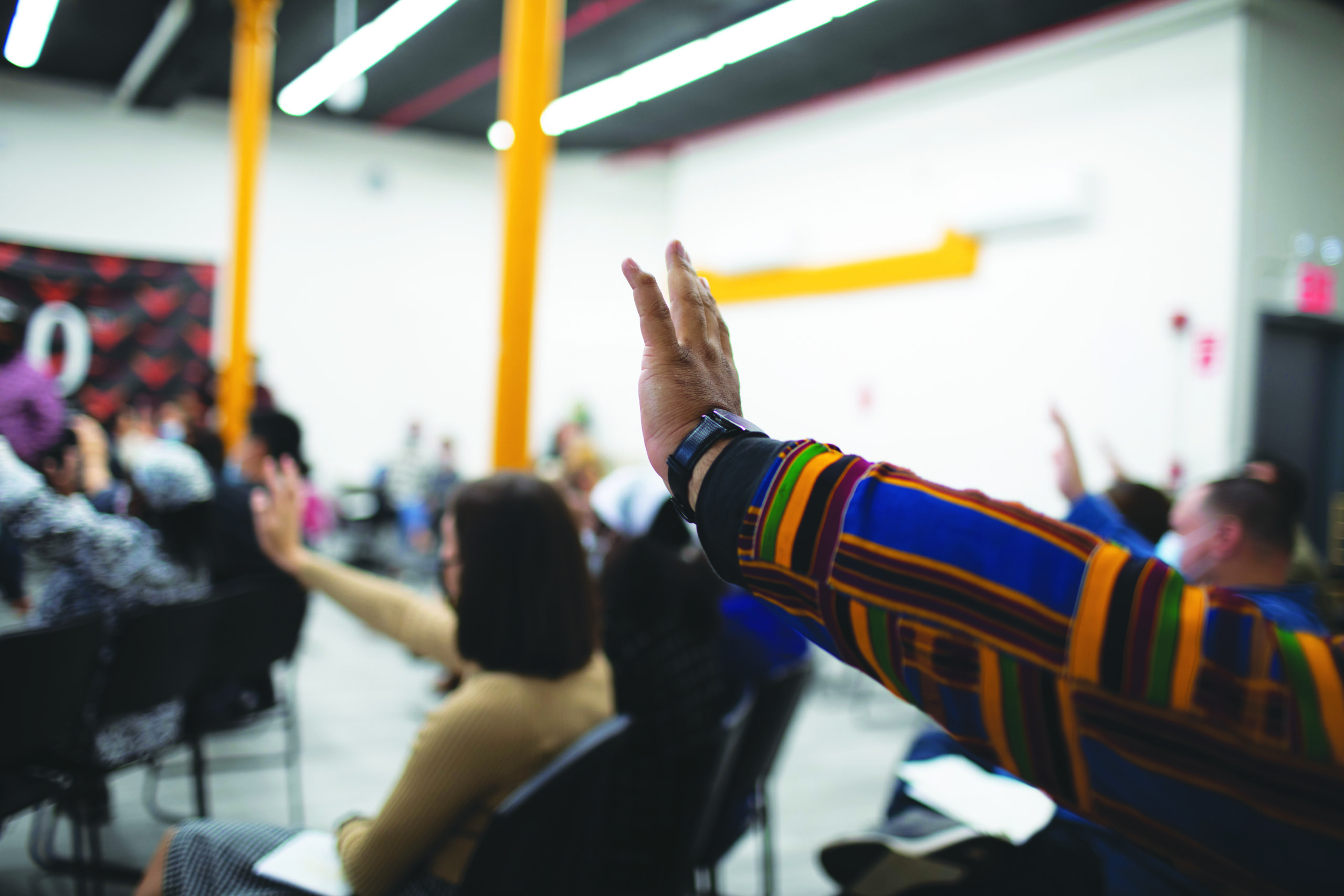

“Because we’re such a small church, we don’t have anything like, ‘this is our “X” ministry that’s been going on for 10 years,’” she says. “It’s kind of like something happens, and we respond. We’re very flexible.” One of these responses has been partnering with Exodus Transitional Community, where Wendy’s co-pastor, José Humphreys, serves as a consultant, and whose building provides a meeting place for Metro Hope’s Sunday services. East Harlem is home to what the Daily News once called “Convict Alley,” where people are dropped off after leaving Rikers Island, New York’s main jail complex. “These folks are our community’s returning citizens,” says Wendy. “Supporting people who are justice-impacted is a big part of what we’re interested in.” That support takes various forms, including a monthly gathering called Writers in Process, where a Metro Hope staff member leads returning citizens through writing and conversational exercises to help process complex emotions they may be experiencing.
For a church like Metro Hope, it’s not difficult to think of ways to serve the community—or to recruit church members to help out in these ministries—because the congregation itself is already made up of people with a bent toward helping. “Our mission is to serve people who are serving the world,” says Wendy. “We’re a lot of behind-the-scenes, servant-hearted people.” The Metro Hope community is made up of teachers, occupational therapists, facilities managers, nonprofit directors, and school administrators. Since it’s New York, there’s also a contingent of artists and performers, who, Wendy says, view their work as storytellers as an act of service as well. “So that’s kind of the vibe of our church. Everyone is actively trying to make the world a better place.”
She mentions one member who works as a vice principal of a school. “They’re choosing to be a person of peace in these kids’ lives,” she says. “They don’t see the students as jobs but as image bearers of God.” Hearing about the Metro Hope community’s work in the world gives Wendy joy. “It’s the only reason I said yes to taking this role,” she says. “I’m not trying to be the pastor of a megachurch or anything. When I get to know these folks and their stories, it really gives me life. It gives me hope.”
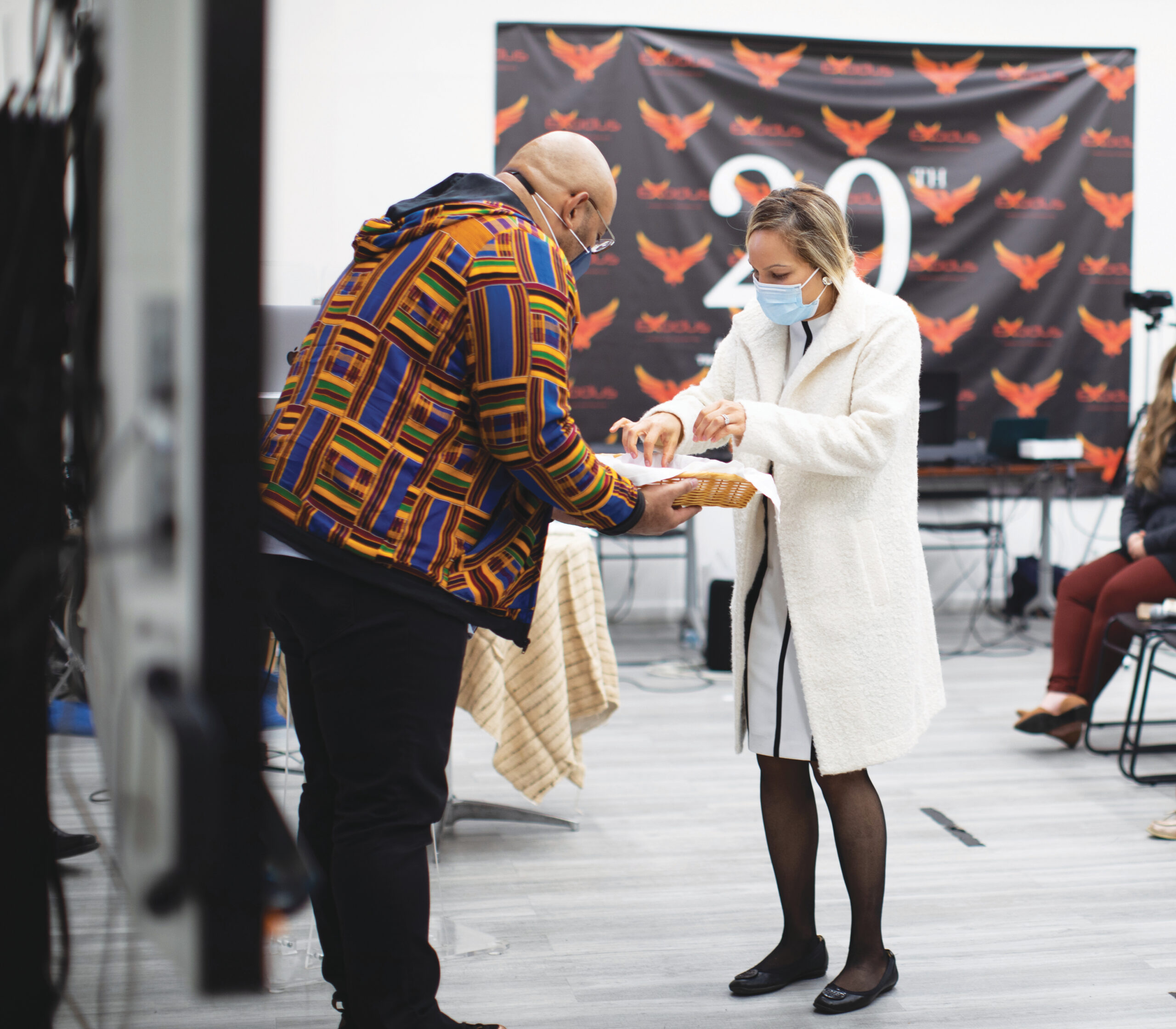

In the early days of the pandemic, this church full of servant-hearted members went straight into action. They exchanged emergency contact information to ensure everyone was looking out for each other and established a benevolence fund to financially assist anyone going through a crisis. On Thursday nights, they came together on Zoom for intercessory prayer. One challenge, however, of having a church made up of helpers is that it can be hard for congregants to ask for much-needed help for themselves. “We’ve given out thousands of dollars from our benevolence fund,” says Wendy, “but not because anybody has ever come to ask us for help.” As their pastor, she tries to see the unspoken needs and organize people to meet the tangible ones, while she sets her own creative energy toward meeting the spiritual needs of the community. Especially now that many have returned to a prepandemic level of busyness, Wendy is considering what Sabbath might look like for people who are often in a mode of doing and serving. “What does rest look like for the folks who care so much about the people they’re serving and are doing really hard things, like participating in the foster care system?” she wonders.
On the whole, Wendy and her co-pastor José have tried to make sure Metro Hope is a place of rest and recovery—a safe space. “If someone shows up to church and doesn’t come back until six months later, there’s no guilt, no judgment. We’re just happy to see them. And I hope that they feel that.” Metro Hope is not only a safe space for the helpers in East Harlem but for the seekers, too. Wendy points out that they tend to attract individuals who might have grown up in the church but, after a period of deconstruction, feel like they might not belong in once familiar church settings. “These folks might feel like the traditional churches they grew up in don’t fit them anymore, and they’re looking for something different,” explains Wendy. “Or maybe they’re exploring spirituality. They’re not ready to commit to Jesus, but there’s something about our church that draws them.” Sometimes they were raised in a different faith and they don’t think church is for them. “But they love so many things about Jesus,” she says. “They love seeing people who have less resources get what they need; they love seeing communities come together.” Wendy defines successful ministry to this group as simply “creating access for people to come to know Jesus and to experience the freedom or the joy” that following him brings.
As Wendy navigates pastoring an urban church like Metro Hope, she sometimes reflects back on a course she took at Fuller, The Spirituality of Henri Nouwen with adjunct professor Wil Hernandez. “The group’s discussions around vulnerability as a leader were probably some of the deepest conversations I’ve had,” she remembers. “It was transformative to think about how it’s not about success, but it’s about experiencing God’s grace and God’s love in everything.” From providing a safe place to land for everyone from justice-impacted folks to people looking for a spiritual home, to seeing the face of Christ in the hardworking members of her church community, to eating jerk chicken at a tiny restaurant on 125th Street, that’s just what Wendy is doing—experiencing and helping others to experience God’s grace and love right where they are, in East Harlem.
Amber Height joins a neighborhood’s fight against gentrification, as she holds to a hopeful vision of a future in which Black life and culture thrive.